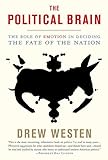The political brain : the role of emotion in deciding the fate of the nation / Drew Westen.
Material type: TextPublication details: New York, NY : PublicAffairs, c2007Description: xv, 475 p. ; 21 cmISBN: 9781586485733 (pbk.); 9781586484255 (hbk.)Subject(s): Presidents -- United States -- Election -- Psychological aspects | Political campaigns -- United States -- Psychological aspects | Voting -- United States -- Psychological aspects | Political parties -- United States -- Platforms | Political psychology | Emotions -- Political aspects | United States -- Politics and government -- 1989- | United States -- Politics and government -- 1945-1989DDC classification: 324.973001/9 LOC classification: JK528 | .W47 2007
TextPublication details: New York, NY : PublicAffairs, c2007Description: xv, 475 p. ; 21 cmISBN: 9781586485733 (pbk.); 9781586484255 (hbk.)Subject(s): Presidents -- United States -- Election -- Psychological aspects | Political campaigns -- United States -- Psychological aspects | Voting -- United States -- Psychological aspects | Political parties -- United States -- Platforms | Political psychology | Emotions -- Political aspects | United States -- Politics and government -- 1989- | United States -- Politics and government -- 1945-1989DDC classification: 324.973001/9 LOC classification: JK528 | .W47 2007| Item type | Current library | Collection | Call number | Copy number | Status | Date due | Barcode |
|---|---|---|---|---|---|---|---|
 Book
Book
|
University of Macedonia Library Βιβλιοστάσιο Α (Stack Room A) | Main Collection | JK528.W47 2007 (Browse shelf (Opens below)) | 1 | Available | 0013115322 |
Includes bibliographical references (p. 441-444) and index.
1. Winning states of mind -- 2. Rational minds, irrational campaigns -- 3. The evolution of the passionate brain -- 4. The emotions behind the curtain -- 5. Special interests in mind -- 6. Trickle-up politics -- 7. Writing an emotional constitution -- 8. Aborting ambivalence -- 9. Gunning for common ground -- 10. Racial consciousness and unconsciousness -- 11. Death and taxes -- 12. Hope, inspiration, and political intelligence -- 13. Positively negative -- 14. Terror networks -- 15. Civil and uncivil unions.
"Hailed by "The Guardian" as "essential reading from Washington to Westminster" this is a groundbreaking study of how the mind works, and what this means for why candidates win and lose elections.Since the 18th Century, the idea of mind that has captured the imagination of philosophers, cognitive scientists, economists and political scientists is of a dispassionate mind that makes decisions by weighing evidence and reasoning to make the most valid conclusions. It bears no relation to how the mind and brain actually work.In this landmark book, Professor Drew Westen - a scientist and psychologist who has led a pioneering investigation into how the brain processes political information - shows through a whirlwind tour of American political leaders how electorates vote not with their heads, but with their hearts. He finds that Americans are a nation of passionate voters, not cool political spectators - they love (or hate) Bill Clinton and George W Bush. No-one else will do. The book, which examines data across several Presidential elections from the 1950s to the present day, is a serious and groundbreaking investigation into the role of emotion in driving voting behaviour."





There are no comments on this title.